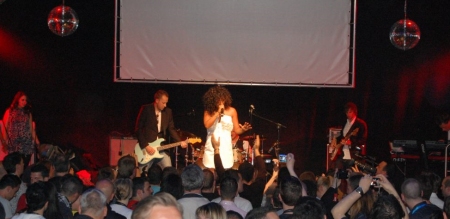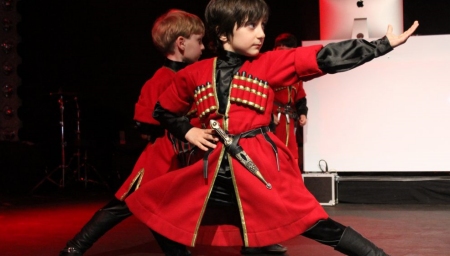Eurovision season is in full swing here in Dusseldorf – the excitement is building and so are the nerves for the performers and delegations. Here in Germany I’ve managed to catch up with several of the acts from so-called New Europe and their take on the contest is somewhat unique, but this event is about for much more than just the music.
These countries see the event as a serious platform for their nation, a way of getting the country’s name out there on the world stage.
Every year countries host parties for the delegations, a further opportunity to promote their entry but also their country. Two countries in particular have stood out – San Marino and Georgia. San Marino hosted a lavish party last night and it served to introduce the international delegates to one of the newer Eurovision entrants and perhaps lesser known countries in Europe.
Stand by for the plucky San Marino.
A country with just over 30,000 people San Marino is by far the smallest nation in the Eurovision Song Contest in 2011. Their singer, Senit, explained why Eurovision is significant for the country. “It’s a way for us to show people that we actually exist! We are here and we are a country in our own right” the Bologna-based singer explained. Moreover she highlighted that even if San Marino does not qualify for the final it has still been a worthwhile journey.
The delegation is happy with the organisation of this year’s event and their party was a symbol of how seriously they are taking Eurovision. Invited guests were treated to fine wine and food from San Marino as well as having people in national costume welcoming the delegates. This was not just a party for the sake of it – it was a chance to promote a lesser known country to the world and it has certainly worked. There is a lot of goodwill towards San Marino and many delegates here are hoping, perhaps more with their hearts than their heads, for Stand By to qualify.
Red, Red Wine.
Speaking of parties, Georgian events are now becoming legendary in their own right and this year was no exception.
In 2007 they hosted a massive gig which was organised by Ukrainian based CFC Consulting, it was by far the biggest party that year. Similarly in 2010 the Georgian party was a big deal with food and wine galore and in the Oslo Opera House. In 2011 delegates were entertained by similar Georgian hospitality with Georgian wine, food, music and dancing.
Unlike the Turkish party the previous night where many acts from 2011 performed, this was a Georgian event on Georgian terms. Previous Georgian Eurovision acts took to the stage, Sopho Khalvashi from 2007 and 2010’s Sofia Nizharadze as well as Eldrine, the entrants for 2011 who performed a full set. Their withdrawn entry from 2009, Stephanie and 3G were perhaps unsurprisingly not in attendance. Along with dancing children of Georgian origin who put on a vibrant stage show, the Head of Delegation, Georgian Jazz singer Maia Baratashvili also took to the stage to perform. The large video screen above the stage played a tourist video showing Georgia’s beauty spots throughout the evening. It was clear that this was an attempt by Georgia to make their mark.
In their press conference that afternoon the significance of Eurovision for Georgia was emphasised. Ramaz Bluashvili, spokesperson for the delegation, stated that Eurovision is a serious event for the country in terms of providing international exposure and promoting the nation particularly as it seeks increased European integration. For Georgia Eurovision is therefore not just a song contest, it is an important symbol and expression of “Europeaness”.
The Georgian Eurovision performance this year also features elements of national culture in the costumes and the on-screen images reflect Georgia’s religious and ancient roots, something which the delegation deemed to be appropriate and were satisfied with. The Georgian party was a serious event – it can be seen as a display of Georgian culture and with the global media presence it served as an effective promotional tool for presenting Georgia as a European nation with much to offer the world. The party was big but managed to retain an intimate atmosphere, it succeed where others have failed in that it was generous without being classless.
From the rest of the world, with love.
Other countries have also been putting in a lot of effort this year – again another smaller nation, Malta have been promoting themselves and using every opportunity to maximise the impact of their participation in Eurovision. Azerbaijan is another country who usually invest heavily on promoting their Eurovision entry. This year they appear to be a little more subdued and as yet there has been no announcement of a party, perhaps they had their fingers burned after last year’s disappointing fifth place (disappointing when you consider the PR budget the delegation had at their disposal).
Nevertheless the two Azeri singers, Ell and Nikki, when I interviewed them said how important Eurovision was for Azerbaijan. Nikki explained that Azerbaijan takes the event very seriously and that the opportunity to host the event is incredibly important and that they would invest a heavily as they want to host “the best and biggest Eurovision ever”. In other words beat Russia’s 2009 production spectacle!
We’ll find out in a few days what is going to happen in Eurovision this year. No matter the size of the country, Eurovision has something for everyone, and may the best song win!
Images by Liam Whelan, Elke Roels and Glen Webb.










